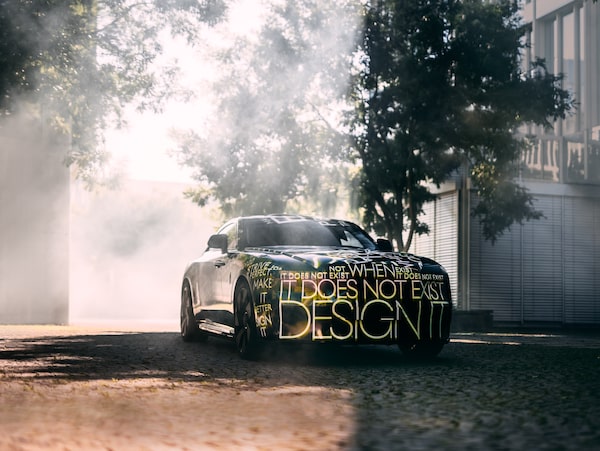
The Rolls Royce Spectre. The Spectre is an enormous all-electric coupe that is expected to arrive in the fourth quarter of 2023.Courtesy of manufacturer
Get your gas-powered Rolls-Royce while you still can, because in 2030 the brand is going all electric.
“By then, Rolls-Royce will no longer be in the business of creating or selling any internal-combustion engine motor cars,” said Rolls-Royce Motor Cars chief executive Torsten Müller-Ötvös.
This week, the company unveiled its first all-electric vehicle called the Rolls-Royce Spectre. It’s an enormous coupe with a fastback shape and doors that open backwards, as per company tradition. The first customers should expect delivery in the fourth quarter of 2023.
The camouflaged car pictured here isn’t a concept; this is the real car, Müller-Ötvös said in a statement. Beyond that, details are scant. A company spokesperson explained the brand didn’t want to estimate range and power only to have to revise those figures later.
The new EV will use the British brand’s proprietary aluminum spaceframe architecture, which also underpins the flagship Phantom sedan, Cullinan SUV and Ghost sedan. This scalable architecture, introduced in 2016, was designed from the beginning to accommodate electric motors and batteries, according to the company. So, despite any visual similarities, the Spectre is not a Rolls-Royce Wraith stuffed full of batteries. The Wraith, the brand’s current gasoline-fueled coupe, is based on a different, older platform shared with the BMW 7 Series.
Given that Rolls’ parent company BMW Group recently launched its fifth-generation electric motors and battery packs, both of which are built in-house by BMW, it is plausible Rolls-Royce will use some of that technology for its own EV. For reference, the new 2022 BMW iX gets roughly 480 km of EPA-estimated driving range from a 105.2 kWh (net capacity) battery. A huge Rolls-Royce could surely pack a few more cells under the hood for added range.
Sustainability in the luxury space is nothing new at this point. Brands including Gucci, Saint Laurent and Balenciaga committed years ago to dramatically reducing their environmental footprint. The question is why has Roll-Royce waited until now to dive into the fast-growing global EV market? Surely its customers all have garages to plug-in an EV overnight. The palatial vehicles the brand is known for are also perfectly suited to electric power since there’s ample space for batteries and nimble handling is hardly a priority for these luxurious land yachts. Company co-founder Charles Rolls was an EV advocate way back in 1900.
“The electric car is perfectly noiseless and clean,” Rolls reportedly said after trying out an early EV. “There is no smell or vibration, and they should become very useful when fixed charging stations can be arranged. But for now, I do not anticipate that they will be very serviceable – at least for many years to come.”
The company he co-founded built electric concept cars in 2011 and 2016, but never followed through with a production model. “We have not been satisfied that available [EV] technology could support the Rolls-Royce experience, until now,” Müller-Ötvös explained.
Other ultra-luxury brands are working on EVs of their own. Mercedes-Maybach recently unveiled an all-electric SUV, which is slated for production in 2023. By then, the delayed Tesla Roadster could be hitting the street too.
To spark some publicity, Rolls-Royce will be undertaking a very public testing program for the Spectre, driving the prototypes on roads around the world over the coming years. They’ll cover 2.5 million kilometres in testing, the equivalent of 400 years of use by the typical Rolls-Royce driver, the company claimed.
Even without a single EV in showrooms, business at Rolls-Royce has been booming lately. The brand sold 2,989 cars in the first half of this year, which is an increase of 92 per cent over the same time last year. This year’s total is better even than the brand’s pre-pandemic sales in the first half of 2019. The company attributed its strong performance in part to the introduction of the all-new Ghost, a $343,140 machine that in this rarified world is actually the brand’s entry-level sedan.
The decision to go all-electric by 2030 is undoubtedly a giant leap for the 117 year-old British automaker, but only a small step along the path to carbon-neutrality for the rest of us.
Shopping for a new car? Check out the Globe Drive Build and Price Tool to see the latest discounts, rebates and rates on new cars, trucks and SUVs. Click here to get your price.
 Matt Bubbers
Matt Bubbers